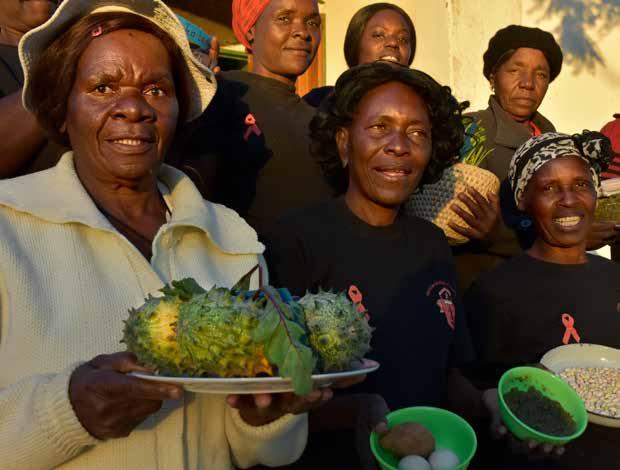
3 minute read
My Status, My Health, My Life
Duncan Dormor and Artwell Sipinyu reflect on an Anglican Church in Zimbabwe (ACZ) programme that is transforming lives with its clear message of love and inclusion for people living with HIV and AIDS.
Linda, Diocese of Harare said, ‘I am a 40 year old HIV positive single mother. I was side-lined by my community and my four children were mocked at school. I felt so much shame and suffering that I contemplated suicide.’
ow self-esteem, suicidal tendencies, isolation and family disintegration are some of the effects of the stigma associated with living with HIV and AIDS. Fear of discrimination reduces the likelihood people will come forward for testing and receive the support and treatment they need.
In 2014, a survey revealed that 65% of those with HIV/AIDS experienced at least one form of stigma and discrimination and almost 31% had been verbally abused, harassed or threatened. The ACZ Bishops launched the HIV Stigma and Discrimination Reduction programme, with USPG accompanying the church as they sought a reduction of HIV stigma and discrimination.
The ACZ’s Stigma Reduction Programme has been training church leaders on issues of HIV and HIV stigma since 2015. This has become a more mainstream topic for church sermons: people who have disclosed their status are now welcomed into the church and offered support.
The ACZ programme also encourages people to come forward for HIV testing and counselling. Knowing their HIV status allows people to make informed decisions: they can receive medication to prolong life, be advised on a suitable diet and join wellness groups. L
‘Wellness Groups’ provide a support network that offers emotional support whilst helping to develop livelihoods through income generation projects. Across the country these dynamic, inspiring and evangelistic groups have powerful stories to tell about Jesus’s inclusive love as they campaign for HIV/AIDS stigma reduction within the ACZ.
Support received from the Bishops and clergy has been critical. Evidence shows this intervention has raised the profile of Anglican Council as a church leading from the front.
Between 2015 and 2019: • 655 church leaders have been trained in addressing HIV related stigma; • The number of people living with HIV and participating in public forums has increased; • 58 Wellness groups have been established in the Anglican Church; • 407,608 people have been reached by the programme and the Stigma Index showed a significant drop from 65% to 21%. FACTS
Bishop Godfrey Tawonezvi, the National Chair and bishop of Masvingo sums it simply: ‘The project has put the church on the map of Zimbabwe’.
Linda has benefitted from Stigma Reduction and says: ‘I am so grateful that the stigma and discrimination reduction programme came to my church. This wonderful programme changed everything. I declared my HIV status in church. I was fully accepted and elected to be a church warden. Now I encourage others to disclose their status’.
Everyone has a role to play in addressing HIV & AIDS. The Anglican Church Community has played a key role in the response to HIV related stigma faced by PLHIV in Zimbabwe contributing significantly to National and Global HIV and AIDS targets. PLHIV are more open to disclose their status as a way of encouraging others who may be still in denial. This is a great achievement! The Stigma Index Study highlighted that 31% of the respondents told their leaders of their status. There was a notable increase in number of PLHIV church members openly disclosing their HIV status in church.
Preventing malnutrition is a key objective in HIV and AIDS management. Adherence
to antiretroviral therapy (ART) is dependent upon the availability of household food and clients are more likely to tolerate ARV drugs if they are food secure. The Church has empowered PLHIV to enjoy food security through supporting Income Generating Activities.
Sylvia Zhungu, Diocese of Central Zimbabwe: ‘Thanks to support at the wellness group, I have continued growing my Kitchenware retail business. The Church continues to encourage us. I rent retail space and customers see a successful business person - not a person living with the virus. I am a role model’.
Support received from the Bishops and clergy has been critical in reducing HIV related stigma in the ACZ. The Church looks forward to continuing to minister to PLHIV and expanding to other areas in Zimbabwe.

Pictured left: Women living with HIV in Zimbabwe. Pictured above: Women showing their vegetables at a rural healthy living garden managed by women living with HIV at rural Mission, Zimbabwe. Credit: USPG/Linette Frewin








